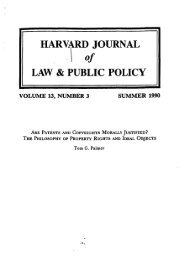G. A. Cohen on Self-Ownership, Property, and ... - Tom G. Palmer
G. A. Cohen on Self-Ownership, Property, and ... - Tom G. Palmer
G. A. Cohen on Self-Ownership, Property, and ... - Tom G. Palmer
Create successful ePaper yourself
Turn your PDF publications into a flip-book with our unique Google optimized e-Paper software.
<strong>Palmer</strong> * <str<strong>on</strong>g>Cohen</str<strong>on</strong>g> <strong>on</strong> <strong>Property</strong> <strong>and</strong> Equality 337pen& not <strong>on</strong>ly <strong>on</strong> Able’s preferences for leisure over labor, but also<strong>on</strong> the expectati<strong>on</strong>s of the parties, <strong>and</strong> this involvement of expectati<strong>on</strong>sby itself entails a radical indeterminacy of result, for, as ThomasSchelling (1960,~) points out, such situati<strong>on</strong>s “ultimately involve anelement of pure bargaining-bargaining in which. each party isguided mainIy by his expectati<strong>on</strong>s of what the other Will accept. Butwith each guided by expectati<strong>on</strong>s <strong>and</strong> knowing that the other is too,expectati<strong>on</strong>s become compounded.”In a case of the sort that <str<strong>on</strong>g>Cohen</str<strong>on</strong>g> describes, in bargaining over a surplusthe bargainer who can precommit credibly will get the share sheprefers, so l<strong>on</strong>g as the other party has not precommitted simultane-~usly.*~ What <str<strong>on</strong>g>Cohen</str<strong>on</strong>g>’s remarks tell us is that G. A. <str<strong>on</strong>g>Cohen</str<strong>on</strong>g> has com-mitted himself, through the vehicle of his published writings, to acertain strategy (fully equal divisi<strong>on</strong>) in the sorts of cases that he describes(as it would, presumably, entail a loss of face or of academicreputati<strong>on</strong> if he were to practice other than he preaches). Any<strong>on</strong>ewho finds herselfin a pure bargaining situati<strong>on</strong> with G. A. <str<strong>on</strong>g>Cohen</str<strong>on</strong>g>. may expect that the <strong>on</strong>ly viable move will be to dem<strong>and</strong> <strong>on</strong>e-half ofwhatever is at stake-no more <strong>and</strong> no less-which is the complementaryequilibrium strategy to an irrevocably committed strategy ofdem<strong>and</strong>ing <strong>on</strong>e half.14 But that strategy may not work with bargainersother than G. A. <str<strong>on</strong>g>Cohen</str<strong>on</strong>g>. Strict egalitarianism is not the uniquelyrati<strong>on</strong>al bargaining strategy that <str<strong>on</strong>g>Cohen</str<strong>on</strong>g> claims it is.<str<strong>on</strong>g>Cohen</str<strong>on</strong>g> believes that his example of the $100 <strong>and</strong> the $I necessaryjointly to purchase a good proves that “there will be no . . . inequality,or its source will not be Able’s ownership of his own powers, butthe influence of the parties’ utility functi<strong>on</strong>s <strong>on</strong> the outcome of thebargaining process.” This c<strong>on</strong>clusi<strong>on</strong> has not, however, been supportedby <str<strong>on</strong>g>Cohen</str<strong>on</strong>g>’s arguments.<str<strong>on</strong>g>Cohen</str<strong>on</strong>g> proceeds to c<strong>on</strong>sider what he calls “a relatively minor objecti<strong>on</strong>to the argument” which is, however, fatal to <str<strong>on</strong>g>Cohen</str<strong>on</strong>g>’s claimthat “self-ownership” c<strong>on</strong>joined with joint ownership of everythingelse will necessarily result in equal income.The objezti<strong>on</strong> is that an owner of a factor of producti<strong>on</strong> couldthreaten to destroy the factor or, what amounts to the same thing (allrelevant effects being relative here), to allow it to decay in value or tofail to augment its productivity, Able, in the cases c<strong>on</strong>sidered above(iv <strong>and</strong> v), “has it in his power to let (part of) his talent decay”(<str<strong>on</strong>g>Cohen</str<strong>on</strong>g> 1ggs,97). However, according to <str<strong>on</strong>g>Cohen</str<strong>on</strong>g> (ibid., 97), ‘What isunclear, because of difficulties in the c<strong>on</strong>cept of rati<strong>on</strong>ality is whether











